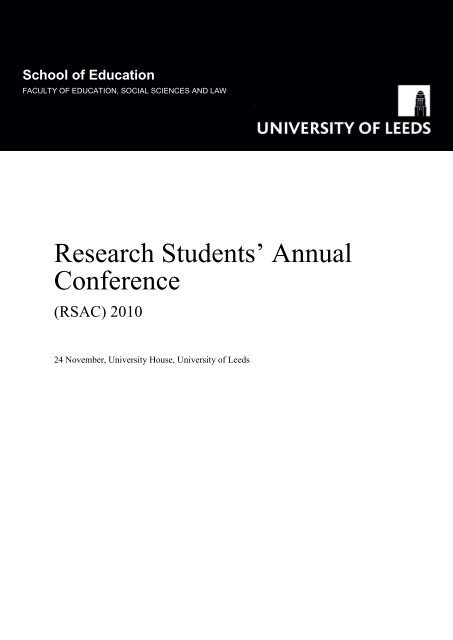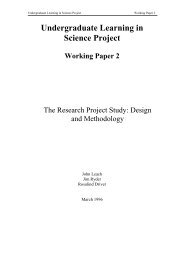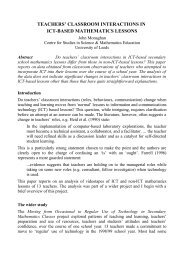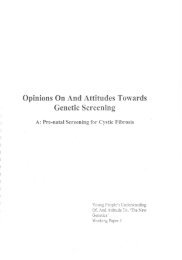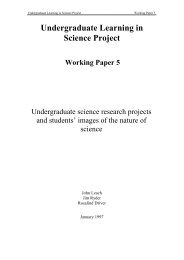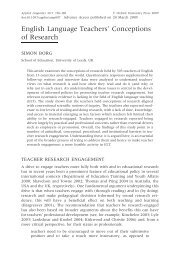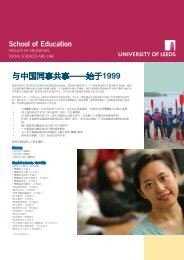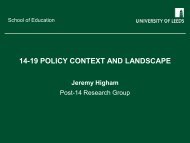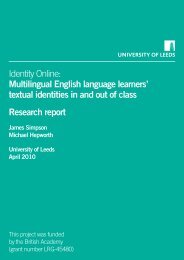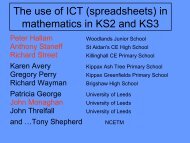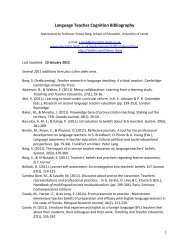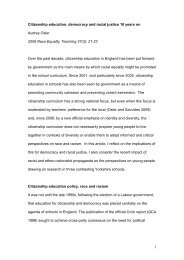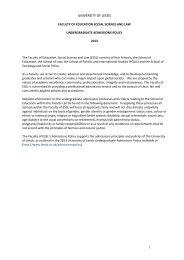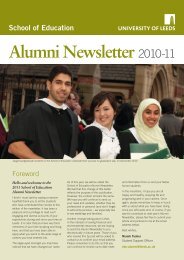Research Students' Annual Conference (RSAC) 2010 - School of ...
Research Students' Annual Conference (RSAC) 2010 - School of ...
Research Students' Annual Conference (RSAC) 2010 - School of ...
You also want an ePaper? Increase the reach of your titles
YUMPU automatically turns print PDFs into web optimized ePapers that Google loves.
<strong>School</strong> <strong>of</strong> Education<br />
FACULTY OF EDUCATION, SOCIAL SCIENCES AND LAW<br />
<strong>Research</strong> Students‘ <strong>Annual</strong><br />
<strong>Conference</strong><br />
(<strong>RSAC</strong>) <strong>2010</strong><br />
24 November, University House, University <strong>of</strong> Leeds
<strong>School</strong> <strong>of</strong> Education <strong>Research</strong> Students’ <strong>Annual</strong> <strong>Conference</strong> (<strong>RSAC</strong>) <strong>2010</strong><br />
24 November, University House, University <strong>of</strong> Leeds<br />
Welcome<br />
We are pleased to welcome you to the Seventh <strong>Research</strong> Students <strong>Annual</strong> <strong>Conference</strong> (<strong>RSAC</strong><br />
<strong>2010</strong>) <strong>of</strong> the <strong>School</strong> <strong>of</strong> Education. This is an important annual event in the <strong>School</strong>‘s calendar<br />
as it brings research students together to present various aspects <strong>of</strong> their studies in a friendly,<br />
supportive environment. As has been the case in previous years, we are sure that the<br />
presentations will prove to be varied, interesting and stimulating.<br />
We are delighted to welcome Pr<strong>of</strong>essor Gary Thomas as the keynote speaker for this year‘s<br />
conference. For the first time, we also welcome the participation <strong>of</strong> research students from the<br />
University <strong>of</strong> York and the University <strong>of</strong> Sheffield and, in addition, a group <strong>of</strong> Masters<br />
students from the University <strong>of</strong> Leeds. The organising committee wishes to thank the research<br />
students who have volunteered to make presentations and also encourage those who were not<br />
able to present today to take advantage <strong>of</strong> such opportunities in future.<br />
Finally, because this event is organised ―by students for students‖, we invite research students<br />
to volunteer to serve in the committee that will organise the <strong>RSAC</strong> for the year 2011.<br />
We hope that you enjoy the day.<br />
Thank you.<br />
The Organising Committee:<br />
<strong>Research</strong> Students<br />
Abdullah Alnutaifi<br />
Ahmad Sohail Lodhi<br />
An-Chi Chen (Angy)<br />
Arthur Galamba<br />
Mike Hickman<br />
Paul Colewood<br />
Shahzada Qaisar<br />
Staff<br />
Aleksandra Szweda<br />
John Monaghan<br />
1
<strong>School</strong> <strong>of</strong> Education <strong>Research</strong> Students’ <strong>Annual</strong> <strong>Conference</strong> (<strong>RSAC</strong>) <strong>2010</strong><br />
24 November, University House, University <strong>of</strong> Leeds<br />
2
<strong>School</strong> <strong>of</strong> Education <strong>Research</strong> Students’ <strong>Annual</strong> <strong>Conference</strong> (<strong>RSAC</strong>) <strong>2010</strong><br />
24 November, University House, University <strong>of</strong> Leeds<br />
The programme<br />
9.15 - 9.45 Registration, tea and c<strong>of</strong>fee, badges and packs<br />
9.45 -<br />
10.00<br />
10.00 -<br />
10.25<br />
10.30 –<br />
10.55<br />
11.00 –<br />
11.25<br />
Welcome address<br />
Great Woodhouse Room<br />
(Chair – Abdullah)<br />
Nahieli Greaves<br />
Decision-making on<br />
pseudoscientific issues: the<br />
role <strong>of</strong> the nature <strong>of</strong> science<br />
Luis Jiro Suzuri-Hernandez<br />
Exploring school students‘<br />
views <strong>of</strong> the nature <strong>of</strong> science<br />
Arthur Galamba<br />
The contribution <strong>of</strong> the poet,<br />
historian and science educator<br />
Rómulo de Carvalho to science<br />
education in Portugal<br />
St. George<br />
(Chair – Ahmad)<br />
Michael Hepworth<br />
The teaching and learning <strong>of</strong><br />
spoken argumentation in<br />
ESOL classrooms<br />
Mike Hickman<br />
Digital audio for self-efficacy<br />
Shahzada Qaisar<br />
The effects <strong>of</strong> collaborative<br />
group work lessons in<br />
Mathematics as an alternative<br />
method for concept<br />
development <strong>of</strong> the students<br />
at elementary level in<br />
Pakistan.<br />
11.30 –<br />
11.40 COFFEE BREAK<br />
11.40 –<br />
12.05<br />
12.10 –<br />
12.35<br />
12.40 –<br />
1.05<br />
Beech Grove<br />
(Chair – Paul)<br />
Maria Tress<br />
Resilience in Academia: A<br />
study <strong>of</strong> Latin-American<br />
Academics Coping in their<br />
Workplace in the UK<br />
Kyriakos Demetriou<br />
Information Communication<br />
Technology: a tool for<br />
Inclusion in Cyprus<br />
(Chair – Arthur) (Chair – Angy) (Chair – Mike)<br />
Hui-Fen Wu<br />
Learning from experience:<br />
teacher/parent narratives about<br />
the emotional lives <strong>of</strong> preschool<br />
autistic children<br />
Paul Colewood<br />
Methodological<br />
considerations in<br />
interviewing children <strong>of</strong><br />
primary school age<br />
Shaista Shirazi<br />
The relationship <strong>of</strong> student<br />
experience <strong>of</strong> school science to<br />
post-16 science take-up<br />
Jeff Potter<br />
Vocational education and<br />
training for the childcare<br />
pr<strong>of</strong>ession<br />
Paula Rebolledo<br />
Exploring action research on<br />
a pr<strong>of</strong>essional development<br />
course in Chile<br />
Carrie Birch<br />
An investigation <strong>of</strong> learning<br />
culture in socially excluded<br />
communities.<br />
Suad Al Fori<br />
A Dot in a Whole Circle –<br />
how parental partnership is<br />
perceived and promoted by<br />
the Ministry <strong>of</strong> Education<br />
(MOE) in Oman to help<br />
pupils, specifically those<br />
with Specific Learning<br />
Difficulties<br />
Wan Wan<br />
Using Metaphorical<br />
Conceptualisation to<br />
Construct and Develop<br />
EFL Students‘ Writing:<br />
An Exploratory Study<br />
1.10 – 2.00 LUNCH AND POSTER DISPLAY<br />
2.00 – 3.00<br />
Plenary: Reductionism, holism, context and theory - what is case study?<br />
Pr<strong>of</strong>essor Gary Thomas, Head <strong>of</strong> <strong>School</strong> <strong>of</strong> Education, University <strong>of</strong> Birmingham<br />
3.00 – 3.15 TEA BREAK<br />
3.15 – 4.00<br />
Panel session: considering questions raised during the course <strong>of</strong> the day<br />
Chairs: Mike Hickman, Paul Colewood<br />
4.00 – 4.15 Closing and certificates<br />
3
Room 2 /<br />
St<br />
George<br />
Room1 / Great Woodhouse<br />
<strong>School</strong> <strong>of</strong> Education <strong>Research</strong> Students’ <strong>Annual</strong> <strong>Conference</strong> (<strong>RSAC</strong>) <strong>2010</strong><br />
24 November, University House, University <strong>of</strong> Leeds<br />
Abstracts<br />
Name<br />
Email<br />
Title<br />
10.00 – 10.25 Parallel sessions 1<br />
Nahieli Greaves<br />
nahielig@yahoo.com<br />
Decision-making on pseudoscientific issues: the role <strong>of</strong> the nature <strong>of</strong> science<br />
It has been argued that a sophisticated understanding <strong>of</strong> the nature <strong>of</strong> science (NOS) can help students<br />
distinguish between science and pseudoscience. However, up until now the role played by the NOS in<br />
decision-making about pseudoscientific issues remains controversial. As part <strong>of</strong> this study, the role<br />
played by the NOS in decisions about pseudoscientific issues, and whether its use is itself influenced<br />
by the context, were assessed. Three scenarios were designed to probe students‘ decision-making and<br />
its underlying rationale: weight-loss pills, Aids denialism and quantum medicine. The first two<br />
touched upon topics students were familiar with, whereas the last was new to them. 128<br />
undergraduates were asked to make, and justify, a decision about whether to use a therapy or health<br />
product. They tended to reject the claims made by Aids denialists and weight-loss pills sellers, while<br />
remaining open to the claims <strong>of</strong> quantum medicine advocates. Whenever students used the NOS to<br />
justify their decisions, they rejected the pseudoscientific claims. In contrast, justifications outside the<br />
scope <strong>of</strong> the NOS led students to accept them. These findings suggest that the NOS is useful in<br />
distinguishing science from pseudoscience, independently <strong>of</strong> the context.<br />
Name<br />
Email<br />
Title<br />
10.00 – 10.25 Parallel sessions 2<br />
Michael Hepworth<br />
edmdh@leeds.ac.uk<br />
The teaching and learning <strong>of</strong> spoken argumentation in ESOL classrooms<br />
What is argumentation? How do teachers and learners engage with it in ESOL classrooms?<br />
In this session I will present a short stretch <strong>of</strong> data gathered as part <strong>of</strong> my investigation into the<br />
teaching and learning <strong>of</strong> argumentation in an ESOL context. This data will form the basis <strong>of</strong> the rest<br />
<strong>of</strong> the presentation and some discussion.<br />
4
Room1 / Great Woodhouse<br />
Room 3 / Beech Grove<br />
<strong>School</strong> <strong>of</strong> Education <strong>Research</strong> Students’ <strong>Annual</strong> <strong>Conference</strong> (<strong>RSAC</strong>) <strong>2010</strong><br />
24 November, University House, University <strong>of</strong> Leeds<br />
Name<br />
Email<br />
Title<br />
10.00 – 10.25 Parallel sessions 3<br />
Maria Tress<br />
edmbt@leeds.ac.uk<br />
Resilience in Academia: A study <strong>of</strong> Latin-American academics coping in their workplace in<br />
the UK<br />
Fundamentally, resilience in the workplace can be considered as the ability to bounce back from<br />
adversity while maintaining personal and corporate integrity (McDargh, 2002). Most <strong>of</strong> resilience<br />
research has focused on children, adolescents and clearly disadvantaged individuals, paying few<br />
attention to the Higher Education sector. Hence this study focuses on the resilient attitudes <strong>of</strong> 20<br />
Latin-American academics within various universities in the United Kingdom. Through in-depth<br />
interviews, it is expected to reveal what kind <strong>of</strong> challenges and/or demands these academics face and<br />
the ways that they cope with such challenges in their work life. Even though this study is a still at the<br />
data collection stage, findings obtained from a preliminary analysis will be discussed.<br />
References:<br />
McDargh, E. (2002) The resilient spirit: Heart talk for staying rightside up in a world that's upside<br />
down. USA: Loch Lomond Press<br />
Name<br />
Email<br />
Title<br />
10.30 – 10.55 Parallel sessions 1<br />
Luis Jiro Suzuri-Hernandez<br />
Ijsh500@york.ac.uk<br />
Exploring school students’ views <strong>of</strong> the nature <strong>of</strong> science<br />
As part <strong>of</strong> a larger project to develop and validate an instrument suitable for the summative<br />
assessment <strong>of</strong> 16-year old students‘ understandings <strong>of</strong> the nature <strong>of</strong> science (NoS), fourteen focus<br />
groups were conducted with English and Mexican students with the aim <strong>of</strong> exploring their views. The<br />
aspects <strong>of</strong> the NoS covered in the focus groups were: (a) difference between data and explanation; (b)<br />
theory-ladenness <strong>of</strong> data; (c) role <strong>of</strong> imagination in coming up with explanations; (d) nature <strong>of</strong> the<br />
scientific method; (e) underdetermination <strong>of</strong> explanation by data; (f) grounds for belief in an<br />
explanation; and (g) tentativeness <strong>of</strong> scientific knowledge. Results suggest that students tend to have<br />
an inconsistent understanding <strong>of</strong> the NoS: while their views about a particular aspect might be<br />
nuanced and/or developed, those <strong>of</strong> another might be naïve and/or equivocal. Furthermore, students<br />
appear to lack an adequate supply <strong>of</strong> scientific examples—historical or contemporary—upon which to<br />
base their thinking. These findings have important implications for future research on, and the<br />
teaching <strong>of</strong>, the NoS: adequate views do not warrant the assumption that students possess consistent<br />
or more than superficial understandings <strong>of</strong> the NoS.<br />
5
Room 3 / Beech Grove<br />
Room 2 / St George<br />
<strong>School</strong> <strong>of</strong> Education <strong>Research</strong> Students’ <strong>Annual</strong> <strong>Conference</strong> (<strong>RSAC</strong>) <strong>2010</strong><br />
24 November, University House, University <strong>of</strong> Leeds<br />
Name<br />
Email<br />
Title<br />
10.30 – 10.55 Parallel sessions 2<br />
Mike Hickman<br />
m.hickman@yorksj.ac.uk<br />
Digital audio for self-efficacy<br />
This workshop will focus on teacher trainee use <strong>of</strong> digital audio within an Initial Teacher Education<br />
maths module. Given the need for trainees to develop an understanding <strong>of</strong> the importance <strong>of</strong> ‗talk‘ in<br />
the primary classroom and within mathematical problem solving, podcasting/digital audio was<br />
considered the most appropriate vehicle.<br />
Informed by initial experiences <strong>of</strong> employing podcasting/digital audio to support feedback and<br />
provide additional subject knowledge input, it is now proposed that audio material (recorded and<br />
analysed by the trainees within group tasks) will be used to support problem-solving strategies/selfefficacy<br />
in mathematics teaching. The ambition is for students to not only engage with vital<br />
pedagogy for the classroom but also extend their thinking through more considered investigation <strong>of</strong><br />
peer responses to given problems (more than would be possible within the time constraints <strong>of</strong> a<br />
normal session).<br />
Key questions to be considered include: What kinds <strong>of</strong> discussions should the teacher be initiating<br />
with children? What counts as a high quality response to such a task? The digital audio recordings<br />
will enable trainees to interrogate their own responses (and, indeed, their approach to problem<br />
solving), informed by work such as Mercer‘s (1995) ideas <strong>of</strong> cumulative, disputational and<br />
exploratory talk.<br />
Name<br />
Email<br />
Title<br />
10.30 – 10.55 Parallel sessions 3<br />
Kyriakos Demetriou<br />
kdemetriou@gmail.com<br />
Information communication technology: a tool for inclusion in Cyprus<br />
In the 1990s, the philosophy <strong>of</strong> integration <strong>of</strong> children with SEN in mainstream schools shifted into a<br />
higher target <strong>of</strong> the contemporary educational trend <strong>of</strong> Inclusion. Inclusion portrays a broader vision<br />
<strong>of</strong> integration emphasising the rebuilding <strong>of</strong> the curricular supplies in order for them to be accessible<br />
to all pupils as individuals and increases the likelihood that all teachers will have the opportunity to<br />
have children with SEN in their classroom at some stage in their careers. There is strong literature<br />
evidence that Information Communication Technology can be used as an ultimate tool to support<br />
Inclusion and that it can help teachers to differentiate their instruction, and thus, equalize the learning<br />
opportunities and physical access for every single student in the mainstream classroom. In Cyprus,<br />
the single-computer classroom model provides restricted facilities to teachers who face difficulties for<br />
embedding ICT in their instruction due to limited resources. As such, it would be beneficial to<br />
investigate how the single-computer model can be used for promoting inclusion in mainstream<br />
classrooms in Cyprus. My presentation outlines the framework for the study and the questions it<br />
seeks to address.<br />
6
Room1 / Great<br />
Woodhouse<br />
Room2 / St.<br />
George<br />
Room1 / Great<br />
Woodhouse<br />
<strong>School</strong> <strong>of</strong> Education <strong>Research</strong> Students’ <strong>Annual</strong> <strong>Conference</strong> (<strong>RSAC</strong>) <strong>2010</strong><br />
24 November, University House, University <strong>of</strong> Leeds<br />
Name<br />
Email<br />
Title<br />
11.00 – 11.25 Parallel sessions 1<br />
Arthur Galamba<br />
edaa@leeds.ac.uk<br />
The contribution <strong>of</strong> the poet, historian and science educator Romulo de Carvalho to science<br />
education in Portugal<br />
From the beginning <strong>of</strong> the twentieth century, science education in Portugal was highly influenced by<br />
the Anglophonic literature, with strong emphasis on experimental demonstration and laboratory<br />
activities – the heuristic methodology. Speaking about his intervention in a curriculum Reform in<br />
1947, Carvalho has acknowledged his ideas were radically opposed to what was being carried out<br />
before. It is not clear, however, what were the sources <strong>of</strong> Carvalho‘s pedagogy rationale and, more<br />
important, what his ideas represented in the history <strong>of</strong> science teaching in Portugal.<br />
In this presentation I try to shed light on the following questions:<br />
What did such a multifaceted science educator think about science teaching? In what educational<br />
context is his work found? Did he receive any influence from educators worldwide?<br />
Name<br />
Email<br />
Title<br />
11.00 – 11.25 Parallel sessions 2<br />
Shahzada Qaisar<br />
edsq@leeds.ac.uk<br />
The effects <strong>of</strong> collaborative group work lessons in Mathematics as an alternative method for<br />
concept development <strong>of</strong> the students at elementary level in Pakistan<br />
My research examines the impact <strong>of</strong> implementing an intervention in upper primary mathematics<br />
lessons in Pakistan. This is evaluated not by the direct evidence <strong>of</strong> learning impact in an experimental<br />
model, but through the indirect evidence <strong>of</strong> its effects on student interaction and attitudes. The data<br />
sources are classroom observations, audio and video recordings, field notes and interviews. I‘m<br />
currently in the data analysis phase. In the presentation, I will share the different challenges that I face<br />
in developing the analytical framework to analyse the students‘ discourse during collaborative group<br />
work.<br />
Name<br />
Email<br />
Title<br />
11.40 – 12.05 Parallel sessions 1<br />
Hui-Fen Wu<br />
edp09hw@shef.ac.uk<br />
Learning from experience: teacher/parent narratives about the emotional lives <strong>of</strong> pre-school<br />
autistic children<br />
The aim <strong>of</strong> the research design is to look for common ground and to what extent autistic individuals<br />
experience and cope with emotions. In this study, parents and teachers <strong>of</strong> preschool children who<br />
have been diagnosed with ASD will be the participants. It is my intention to select the parents and<br />
teachers <strong>of</strong> two preschool autistic children from the UK and two from Taiwan. In each country one<br />
child will be from mainstream classes and one from special(resource) classes. The researcher has<br />
chosen interpretative phenomenological analysis (IPA) for the research approach. The semistructured<br />
interviews will be designed to gather information from current school teachers and parents<br />
rather than the students directly in order to obtain relevant data and obviate the influence <strong>of</strong> the<br />
relationship between the interviewer and the student which has not been influenced by the presence <strong>of</strong><br />
the interviewer.<br />
7
Room1 / Great<br />
Woodhouse<br />
Room 3 / Beech Grove<br />
Room2 / St. George<br />
<strong>School</strong> <strong>of</strong> Education <strong>Research</strong> Students’ <strong>Annual</strong> <strong>Conference</strong> (<strong>RSAC</strong>) <strong>2010</strong><br />
24 November, University House, University <strong>of</strong> Leeds<br />
Name<br />
Email<br />
Title<br />
11.40 – 12.05 Parallel sessions 2<br />
Jeff Potter<br />
jeff.potter@leedscitycollege.ac.uk<br />
Vocational education and training for the childcare pr<strong>of</strong>ession<br />
The research will investigate changes to childcare qualifications (at Level 3 – post 16) using<br />
interviews and questionnaires with FE practitioners, childcare and education providers, Higher<br />
education staff and representatives from awarding bodies and government departments. The changes<br />
to childcare qualifications started with the Children‘s Workforce Development Council (CWDC)<br />
designing a new Level 3 qualification to replace all existing college and work based routes. The study<br />
aims to use Leeds City College as a base for exploring opinion amongst the further education staff<br />
and managers delivering the existing childcare qualifications. The study is exploratory in nature,<br />
using a mixture <strong>of</strong> quantitative and qualitative data to highlight what the changes will mean, how they<br />
will affect those involved and why the changes have happened.<br />
Name<br />
Email<br />
Title<br />
11.40 – 12.05 Parallel sessions 3<br />
Suad Al Fori<br />
widdyff@yahoo.com<br />
A dot in a whole circle!<br />
The study looks at how parental partnership is perceived and promoted by the Ministry <strong>of</strong> Education<br />
(MOE) in Oman to help pupils, specifically those with Specific Learning Difficulties. It employs<br />
qualitative research methods to investigate policies, structures and practices <strong>of</strong> parental partnership in<br />
Oman. To achieve the research aims and answer the research questions the research is carried out in<br />
multi-levels with different groups being targeted and various methods being used to collect data.<br />
Preliminary results show that there are some good promising practices and efforts to promote parental<br />
partnership in Oman; and there is still a lot to be done. A great deal <strong>of</strong> work on parental partnership<br />
seem to be based on individual efforts <strong>of</strong> some personnel in schools, the regional directorate and the<br />
Ministry, and thus it lacks consistency, because, when it comes to parental partnership, there seems to<br />
be little dialogue between them. The pr<strong>of</strong>essionalism model <strong>of</strong> partnership, emphasizing the<br />
dominance <strong>of</strong> the teacher, seems to be prevalent, which could have resulted in the passive role <strong>of</strong><br />
many parents‘ in their children‘s learning. The preliminary results are discussed in terms <strong>of</strong> policies,<br />
funding and accountability and private tuition with respect to parental involvement.<br />
Name<br />
Email<br />
Title<br />
12.10 – 12.35 Parallel sessions 1<br />
Paul Colewood<br />
ed08pcc@leeds.ac.uk<br />
Methodological considerations in interviewing children <strong>of</strong> primary school age<br />
In recent years there have been significant developments in the methodological techniques used for<br />
consulting with children in social science research, with a wide range <strong>of</strong> studies in a variety <strong>of</strong> fields<br />
concerned with listening to the voices <strong>of</strong> children. This can be seen to be part <strong>of</strong> a broader change in<br />
conception which, instead <strong>of</strong> regarding children as peripheral figures to be ―seen and not heard‖,<br />
attaches central importance to the perspectives, actions and attitudes <strong>of</strong> children.<br />
In this presentation I shall focus on the methodological issues which require special attention when<br />
interviewing children <strong>of</strong> primary school age. This will include a consideration <strong>of</strong> the extent to which<br />
research with children is potentially different to research with adults, together with an overview <strong>of</strong><br />
some <strong>of</strong> the key aspects which need to be addressed when interviewing children <strong>of</strong> this age. As well<br />
as considering relevant literature and research, the presentation will draw on the findings <strong>of</strong> my own<br />
pilot study.<br />
8
Room 3 / Beech Grove<br />
Room2 / St. George<br />
<strong>School</strong> <strong>of</strong> Education <strong>Research</strong> Students’ <strong>Annual</strong> <strong>Conference</strong> (<strong>RSAC</strong>) <strong>2010</strong><br />
24 November, University House, University <strong>of</strong> Leeds<br />
Name<br />
Email<br />
Title<br />
12.10 – 12.35 Parallel sessions 2<br />
Paula Rebolledo<br />
prebolledoc@gmail.com<br />
Exploring action research on a pr<strong>of</strong>essional development course in Chile<br />
The different models <strong>of</strong> action research found in the literature pose a difficulty when it<br />
comes to provide a clear-cut definition <strong>of</strong> what it is, promotes and how it is done.<br />
Despite such variety action research has become part <strong>of</strong> teachers‘ education<br />
programmes for several years as it is claimed it promotes teachers‘ pr<strong>of</strong>essional<br />
development, critical reflection as well as emancipation and curriculum development. In<br />
this light, educational innovations in Chile have also called for training about action<br />
research in in-service courses for English teachers in the country. This research<br />
explores the model <strong>of</strong> action research which underpins these in-service courses<br />
according to course designers, teacher trainers and course participants (ELT teachers),<br />
the topic areas they researched, the challenges they faced and to what extent action<br />
research has contributed to their pr<strong>of</strong>essional development during and after the course has ended.<br />
Name<br />
Email<br />
Title<br />
12.10 – 12.35 Parallel sessions 3<br />
Wan Wan<br />
ww510@york.ac.uk<br />
Using metaphorical conceptualisation to construct and develop EFL students’ writing: an<br />
exploratory study<br />
Building on the hypothesis that metaphor awareness in a context-sensitive intervention can lead to<br />
changes in behaviour, and particularly to improvement in L2 academic writing knowledge and skills<br />
(Villamil & de Guerrero, 2005; Hart, 2009), this longitudinal study aims to generate knowledge about<br />
EFL university students‘ on-going understanding <strong>of</strong> academic writing beliefs via an analysis <strong>of</strong> the<br />
metaphors and similes they create and employ in a set <strong>of</strong> decontextualised ―complete a<br />
metaphor/simile‖ tasks. Metaphor is treated as a symbolic mediating tool, facilitating participants‘<br />
mental engagement and learning (<strong>of</strong> writing) (Lak<strong>of</strong>f& Johnson, 1980; Lantolf, 2006) and helping<br />
participants identify their beliefs (about academic writing). The study followed a group <strong>of</strong> seven L2<br />
MA students in the context <strong>of</strong> a 9-session writing seminar for a period <strong>of</strong> an academic year (2009/10).<br />
Data sources included observations <strong>of</strong> classrooms, interviews, and required writing tasks. Data<br />
gathered from these sources also involved student-generated metaphors about writing. The results<br />
showed that metaphorical conceptualization on students‘ beliefs <strong>of</strong> writing resulted in a variety <strong>of</strong><br />
realizations that improved students‘ ability to construct and reflect on the processes and products <strong>of</strong><br />
academic writing and ultimately help them identify their writing difficulty and/or problems.<br />
References:<br />
Hart, G. (2009). Composing metaphors: metaphors for writing in the composition classroom.<br />
Unpublished PhD thesis. Department <strong>of</strong> English, Ohio University.<br />
Lak<strong>of</strong>f, G., & Johnson; M (1980). Metaphors we live-by. Chicago: The University <strong>of</strong> Chicago Press.<br />
Lantolf, J. P. (2006). Conceptual knowledge and instructed second language learning: A sociocultural<br />
perspective. In. S. Fotos& H. Nassaji (Eds.). Form focused instruction and teacher education: studies<br />
in honour <strong>of</strong> Rod Ellis. (pp. 35-54). Oxford: Oxford University Press.<br />
Villamil, O. S., & M. C. de Guerrero. (2005). Constructing theoretical notions <strong>of</strong> L2 writing through<br />
metaphor conceptualization. In N. Bartels (Ed.), Applied linguistics in language teacher education<br />
(pp. 79-90). NY: Springer.<br />
9
Room2 / St. George<br />
Room1 / Great<br />
Woodhouse<br />
<strong>School</strong> <strong>of</strong> Education <strong>Research</strong> Students’ <strong>Annual</strong> <strong>Conference</strong> (<strong>RSAC</strong>) <strong>2010</strong><br />
24 November, University House, University <strong>of</strong> Leeds<br />
Name<br />
Email<br />
Title<br />
12.40 – 1.05 Parallel sessions 1<br />
Shaista Shirazi<br />
edsms@leeds.ac.uk<br />
The relationship <strong>of</strong> student experience <strong>of</strong> school science to post-16 science take-up<br />
Perceptions <strong>of</strong> school science may be an influential factor in the decision to take up science once it is<br />
no longer compulsory. This study aims to investigate which factors in their school experience impact<br />
upon a student‘s decision to take science or not post-16. The study looks at the broad pattern <strong>of</strong><br />
students‘ experience <strong>of</strong> school science and compares responses <strong>of</strong> students who have chosen to take<br />
science at post-16 with those who have decided not to take science.<br />
The exploration <strong>of</strong> students‘ responses is based on the ‗storyline method‘ in which students draw a<br />
storyline to show high and low points in their school experience. Questionnaires will be completed by<br />
sixth form students to show their perceptions <strong>of</strong> school science as they progressed through secondary<br />
school. This will be supported by written explanations <strong>of</strong> high and low points in their storyline<br />
graphs. The study is enhanced with narratives from students through in-depth interviews detailing<br />
perceptions <strong>of</strong> school science as well as the influences impacting on whether they choose science or<br />
not at post-16.<br />
Name<br />
Email<br />
Title<br />
12.40 – 1.05 Parallel sessions 2<br />
Carrie Birch<br />
carriebirchdirect@yahoo.co.uk<br />
An investigation <strong>of</strong> learning culture in socially extended communities<br />
The presentation is based on findings from three interlinked studies undertaken for my thesis. I<br />
explore the idea <strong>of</strong> learning cultures in socially excluded communities, differences between cultures<br />
<strong>of</strong> community and state, and their implications for provision. I describe the impact <strong>of</strong> early<br />
experiences on educational achievement, attitudes to learning, and identity in adult life. Concepts<br />
relevant to the research are social exclusion, educational identity, social capital, learning, culture and<br />
social inequality. I account for my methodology, using life history as a method and highlighting<br />
participants‘ narratives.<br />
The three studies reported were undertaken in one community. The first study provides evidence <strong>of</strong><br />
the nature <strong>of</strong> the community, its culture and social networks as perceived by local residents. The<br />
second study focuses on the experiences <strong>of</strong> adults who had not participated in learning since leaving<br />
school. Findings include the impact <strong>of</strong> early education on participants‘ adult identities and attitudes<br />
to learning, high incidence <strong>of</strong> trauma and low confidence. The third study reports on the life<br />
narratives, with findings including changes in attitudes and educational identities <strong>of</strong> participants in a<br />
project which <strong>of</strong>fered opportunities to learn and reflect on their own lives. Contributions to<br />
knowledge are also reported.<br />
10
Room 1 /<br />
Great Woodhouse<br />
Room 1 /<br />
Great<br />
Woodhouse<br />
<strong>School</strong> <strong>of</strong> Education <strong>Research</strong> Students’ <strong>Annual</strong> <strong>Conference</strong> (<strong>RSAC</strong>) <strong>2010</strong><br />
24 November, University House, University <strong>of</strong> Leeds<br />
Name<br />
Email<br />
Title<br />
Gary Thomas<br />
2.00 – 3.00 Plenary: Pr<strong>of</strong>essor Gary Thomas<br />
g.thomas.3@bham.ac.uk<br />
Reductionism, holism, context and theory - what is case study?<br />
Case study gets a bad press. It is taken to be anecdotal and unstructured. Focused on the individual,<br />
there is no possibility <strong>of</strong> generalisation from it. So what use is it? By looking at the history <strong>of</strong> holism<br />
and reductionism in the history <strong>of</strong> ideas and the benefits that can come from seeing the whole system<br />
working with integrity (if not with purpose or good purpose), I shall argue for the value <strong>of</strong> case study<br />
in understanding what goes on in education.<br />
Chairs<br />
Topic<br />
3.15 – 4.00 Panel session<br />
Mike Hickman, Paul Colewood<br />
Consideration <strong>of</strong> questions raised during the day<br />
In each <strong>of</strong> the presentations, cards and a flipchart are available for the collection <strong>of</strong> questions from<br />
attendees. These are maintained throughout the day and shared with presenters.<br />
The questions collected will be displayed and the chairs <strong>of</strong> the session will choose particular<br />
questions to put to the panel <strong>of</strong> presenters as a whole. The audience is also welcome to contribute.<br />
We hope that this will be an informal, interactive conclusion to the day‘s presentations.<br />
11
<strong>School</strong> <strong>of</strong> Education <strong>Research</strong> Students’ <strong>Annual</strong> <strong>Conference</strong> (<strong>RSAC</strong>) <strong>2010</strong><br />
24 November, University House, University <strong>of</strong> Leeds<br />
Staff:<br />
List <strong>of</strong> participants<br />
# Name # Name<br />
1 Aisha Walker 16 Martin Wedell<br />
2 Aleksandra Szweda 17 Mary Chambers<br />
3 Chris Kyriacou 18 Matt Homer<br />
4 Heather Sears 19 Niamh Tooher<br />
5 Helen Bradbury 20 Penelope Robinson<br />
6 Indira Banner 21 Peter Pool<br />
7 James Simpson 22 Phil Jones<br />
8 Jaume Ametller 23 Phil Scott<br />
9 Jean Conteh 24 Roger Tattersall<br />
10 Jim Donnelly 25 Ruth Garbutt<br />
11 Jim Ryder 26 Sue Haines<br />
12 John Monaghan 27 Sue Long<br />
13 John Threlfall 28 Sue Pearson<br />
14 Linda Evans 29 Sudha Raghavan<br />
15 Louise Greaves 30 Tom Roper<br />
12
<strong>School</strong> <strong>of</strong> Education <strong>Research</strong> Students’ <strong>Annual</strong> <strong>Conference</strong> (<strong>RSAC</strong>) <strong>2010</strong><br />
24 November, University House, University <strong>of</strong> Leeds<br />
<strong>Research</strong> Students:<br />
List <strong>of</strong> participants<br />
#<br />
Name # Name<br />
1 Abdullah M. Alnutaifi 30 Kwengnam Kim<br />
2 Ahmad Sohail Lodhi 31 Kyriakos Demetriou<br />
Aleksandrs Zlatopolskis Luis Jiro Suzuri-<br />
3<br />
32<br />
Hernandez<br />
4 Amira Al-Shabibi 33 Maria Bertani Tress<br />
5 An-Chi Chen 34 Maria Turkenburg<br />
6 Andrew Gunn 35 Michael Hepworth<br />
7 Arthur Galamba 36 Mike Hickman<br />
Ashraf Darwish<br />
Mohammmed Yhya M<br />
8<br />
37<br />
Ali<br />
9 Atiyyah Edwards 38 Munira Said Al Siyabi<br />
10 Carla Assuncao 39 Munirah Abd Hamid<br />
11 Carrie Birch 40 Mutlu Cukurova<br />
Chris Markham<br />
Nahieli Greaves-<br />
12<br />
41<br />
Fernandez<br />
13 Dora Orfanidou 42 Nasrin Altuwairesh<br />
14 Eleni Slvva 43 Nicolae Ionela Cristina<br />
15 Elisavet Stylianou 44 Nitchaya Boonma<br />
16<br />
Ghada Alhudaithi<br />
Nor Haslynda A.<br />
45<br />
Rahman<br />
17<br />
Golebamang Galegane Nuzul Harlina Abdul<br />
46<br />
Rahman<br />
18 Halima Al-Badwawi 47 Omeir Alenezi<br />
19 Helen Jang 48 Owens Berunga<br />
20 Helen Morris 49 Paul Colewood<br />
21 Hetal Shukla 50 Paula Rebolledo<br />
22 Hilda Donkor 51 Rebecca Kay Pritchard<br />
23 Hui-Fen Wu 52 Shahzada Qaisar<br />
24 Hye Won Kim 53 Shaista Shirazi<br />
25 Irene Vanderpuye 54 Siti Raudhah Amri<br />
26 Jane Reas 55 Suad Al Fori<br />
27 Jeff Potter 56 Svava Petursdottir<br />
28 Karen Manriquez 57 Valerie Nave<br />
29 Khalid Altayyar 58 Wan Wan<br />
13
<strong>School</strong> <strong>of</strong> Education <strong>Research</strong> Students’ <strong>Annual</strong> <strong>Conference</strong> (<strong>RSAC</strong>) <strong>2010</strong><br />
24 November, University House, University <strong>of</strong> Leeds<br />
14


